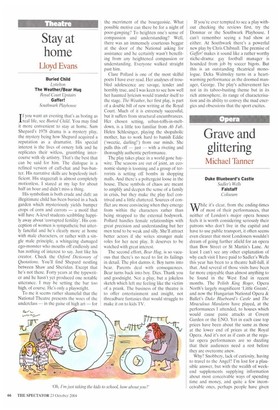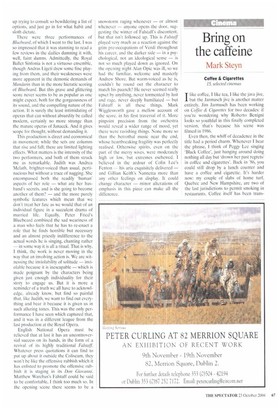Grave and glittering
Michael Tanner
Duke Bluebeard's Castle Sadler's Wells Falstaff Coliseum While it's clear, from the ending-times of most of their performances, that neither of London's major opera houses feels it is worth considering seriously their patrons who don't live in the capital and have to use public transport, it often seems even clearer that most Londoners wouldn't dream of going further afield for an opera than Bow Street or St Martin's Lane. At least I can't see any other explanation of why each visit I have paid to Sadler's Wells this year has been to a theatre half-full, if that. And several of those visits have been far more enjoyable than almost anything to be found in the West End in recent months. The Polish King Roger, Opera North's largely magnificent 'Little Greats', and now the Hungarian National Opera & Ballet's Duke Bluebeard's Castle and The Miraculous Mandarin have played, at the performances I attended, to houses which would cause panic attacks at Covent Garden or the ENO. Yet in each case top prices have been about the same as those at the lower end of prices at the Royal Opera. And it's not as if casts at the regular opera performances are so dazzling that their audiences need a rest before they are overcome anew.
Why? Snobbery, lack of curiosity, having to travel to the Angel? I'm lost for a plausible answer, but with the wealth of weekend supplements supplying information about most conceivable ways of spending time and money, and quite a few inconceivable ones, perhaps people have given up trying to consult so bewildering a list of options, and just go in for what habit and sloth dictate.
There were three performances of Bluebeard, of which I went to the last. I was so impressed that it was stunning to read a few reviews in the dailies damning it with, well, faint damns. Admittedly, the Royal Ballet Sinfonia is not a virtuoso ensemble, though Andras Ligeti drew some fine playing from them, and their weaknesses were more apparent in the demonic demands of Mandarin than in the more hieratic scoring of Bluebeard. But this grave and glittering score never seems to be as popular as one might expect, both for the gorgeousness of its sound, and the compelling nature of the action. It is surely the least intimidating of operas that can without absurdity be called modern, certainly no more strange than the mature operas of Janacek. And it gives scope for thought, without demanding it.
This production is direct and economical in movement; while the sets are columns that rise and fall; there are limited lighting effects. What matters is the intensity of the two performers, and both of them struck me as remarkable. Judith was Andrea Melath, brighter-voiced than usual, pertinacious hut without a trace of nagging. She encompassed both the readily 'human' aspects of her role — what are her husband's secrets, and is she going to become another of them? — and the more purely symbolic features which mean that we don't treat her fate as we would that of an individual figure in a succulent drama of married life. Equally, Peter Fried's Bluebeard combined the sad weariness of a man who feels that he has to re-enact a role that he finds horrible but necessary and an almost priestly indifference to the actual words he is singing, chanting rather — in some way it is all a ritual. That is why, I think, the work is never moving in the way that an involving action is. We are witnessing the inviolability of solitude — inviolable because it is inescapable — which is made poignant by the characters being given just enough individuality for their story to engage us. But it is more a reminder of a truth we all have to acknowledge, already know, but find so painful that, like Judith, we want to find out everything and bear it because it is given us in such alluring tones. This was the only performance I have seen which captured that, and it was in a different league from the last production at the Royal Opera.
English National Opera must be relieved that at last it has an uncontroversial success on its hands, in the form of a revival of its highly traditional Falstaff Whatever press quotations it can find to put up about it outside the Coliseum, they won't be like the offensive rubbish which it has enlisted to promote the offensive rubbish it is staging in its Don Giovanni. Matthew Warchus's Falstaff could he said to be comfortable, I think too much so. In the opening scene there seems to be a snowstorm raging whenever — or almost whenever — anyone opens the door, suggesting the winter of Falstaffs discontent, but that isn't followed up. This is Falstaff played very much as a reaction against the grim pre-occupations of Verdi throughout his career, and the darker side — in a psychological, not an ideological sense — is not so much played down as ignored. On the opening night Alan Opie was ill, so we had the familiar, welcome and masterly Andrew Shore. But warm-voiced as he is, couldn't he round out the character to match his paunch? He never seemed really upset by anything, never tormented by lust and rage, never deeply humiliated — but Falstaff is all these things. Mark Wigglesworth gave a mellow account of the score, in his first traversal of it. More pinpoint precision from the orchestra would reveal a wider range of mood, yet there were ravishing things. None more so than the betrothal music near the end, whose heartbreaking fragility was perfectly realised. Otherwise spirits, even on the part of the merry wives, were moderately high or low, but extremes eschewed. I believed in the ardour of Colin Lee's Fenton his aria exquisitely delivered — and Gillian Keith's Nannetta more than any other feelings on display. It could change character — minor alterations of emphasis in this piece can make all the difference.

























































































 Previous page
Previous page